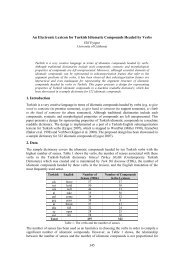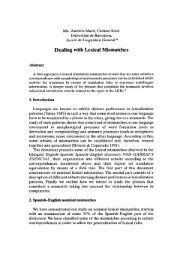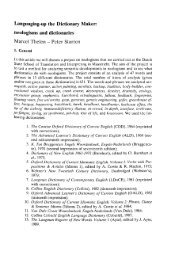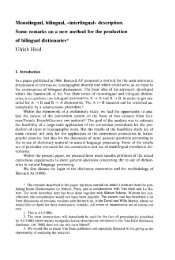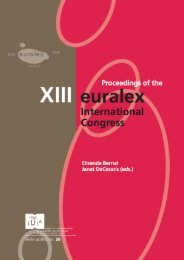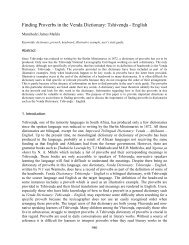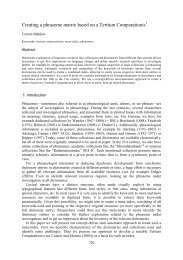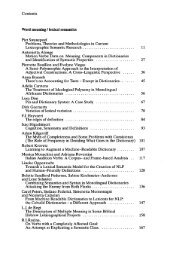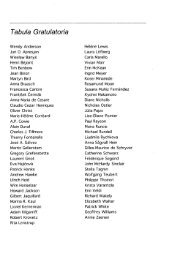Collocations in a New Bilingual Print and Electronic English - Euralex
Collocations in a New Bilingual Print and Electronic English - Euralex
Collocations in a New Bilingual Print and Electronic English - Euralex
You also want an ePaper? Increase the reach of your titles
YUMPU automatically turns print PDFs into web optimized ePapers that Google loves.
EüRALEX 2002 PROCEEDINGS<br />
The Presentation of <strong>Collocations</strong><br />
The Base as Subject ofthe Verb<br />
Many n + v collocations consist ofthe subject as the base <strong>and</strong> the verb as the collocate. Here,<br />
the collocate expresses the basic action [Benson, 1985] ofthe verb. A full collocation <strong>in</strong> the<br />
article, however, would look strange:<br />
*bark...v/... dogs~Hundebellen;<br />
*explode ... vi... bombs ~ Bomben explodieren;<br />
The autosemantic base doesn't generally pose a significant challenge, neither <strong>in</strong> reception<br />
nor production, but <strong>in</strong> order to ma<strong>in</strong>ta<strong>in</strong> a natural style, such comb<strong>in</strong>ations appear as follows<br />
bark... vi... dog bellen;<br />
explode... vi... bomb explodieren;<br />
screech ... vi ...person schreien; on/ma/kreischen; brakes, tyres quietschen;<br />
There are additional categories ofverbs, <strong>in</strong> which the base is their only argument. Many of<br />
these can be described us<strong>in</strong>g Mel'cuk's lexical functions such as Func, Incep, Fact <strong>and</strong><br />
Degrad Pvfel'cuk 1995]. When relevant to the L2 speaker, these are h<strong>and</strong>led <strong>in</strong> the same<br />
manner <strong>in</strong> PGE.<br />
break out... vi... storm losbrechen;<br />
rise ... vi... sun, moon aufgehen;... mood, spirit steigen;... voice höher gehen;<br />
wear off... v/... effect nachlassen;<br />
The Base as a Range of Lexical Items<br />
In some cases, a collocator can comb<strong>in</strong>e with a range of lexical items which represent a<br />
lexical field. Cowie [1978]•, <strong>in</strong> his analysis of the possibilities for represent<strong>in</strong>g such<br />
phenomena, concludes that the only practical solution is to pick a representative selection of<br />
bases <strong>and</strong> list these (see also section 4.6). This appears <strong>in</strong> PGE as follows:<br />
assault... n .an ~ on racism/sexism e<strong>in</strong> Feldzug gegen Rassismus/Sexismus;<br />
burst ... vi' ...to ~ with anger/curiosity/joy/pride vor Wut^4eugier^Freude/Stolz platzen; to with<br />
energy/health/joie de vivre vor Kraft/Gesundheit^ebensfreude [nur so] strotzen; to ~ with<br />
excitement/happ<strong>in</strong>ess vor Aufregung/Glück ganz außer sich dat se<strong>in</strong>;<br />
bruise... vt ...to ~ sb's ego/feel<strong>in</strong>gs/pridejds Ego n//Gefflhlej^//Stolz m verletzen;<br />
<strong>Collocations</strong> <strong>and</strong> Sentence Mode<br />
In most cases, a collocation will reta<strong>in</strong> its translation, regardless of the sentence mode.<br />
However, pragmatics <strong>and</strong> sentence mode can both have an effect on the L2 translation, <strong>in</strong><br />
which case the collocation is first shown <strong>in</strong> st<strong>and</strong>ard form, followed by an example sentence,<br />
illustrat<strong>in</strong>g either the sentence mode or the pragmatic circumstance which causes the<br />
deviation <strong>in</strong> translation.<br />
802



